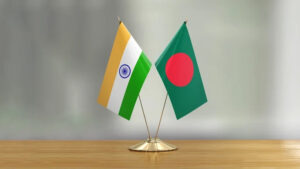
M Serajul Islam
IT IS unlawful in Bangladesh to criticise friendly countries on the media presumably to contain anti-Indian feelings as a gratitude for India’s support in Bangladesh’s liberation war. The law in question appears to be breaking at the seams which was apparent from the raucous public celebrations for India’s defeat by Australia in the ODI World Cup Championship final in November 2023. The Bangladesh media widely reported the anti-Indian celebrations.
The role of India in Bangladesh’s surreal January 7 general election that followed India’s World Cup Championship defeat has flagged further that the law under which anti-Indian criticism was taboo on the Bangladesh media has now become irrelevant. The Indian media, more than its Bangladeshi counterpart, have undermined the taboo. The Indian media now openly acknowledges the presence of anti-Indian sentiments in the country.
The Telegraph Online, an Indian newspaper, in an article on February 1 stated that anti-Indian sentiments have been present in Bangladesh since its birth in 1971. The article described these sentiments as ‘stubborn’ because they have refused to go away. This and similar articles by Indian political analysts blamed Bangladesh’s predominantly Muslim society; the Bangladesh Nationalist Party’s anti-Indian politics and anti-Hindu feelings of the Islam-based political parties for the ‘stubbornness’ of anti-Indian feelings in Bangladesh.
Blaming the BNP and Bangladesh’s Muslim society for the anti-Indian sentiments while apportioning none on India where Hindu fundamentalism is raving and raging is a biased view that diverts attention from a major problem in Bangladesh-Indian relations. The Bangladesh Nationalist Party has strong anti-Indian views, but these are predominantly political and very little anti-Hindu or communal. The Indian view that the Islamic parties in Bangladesh are anti-Indian and anti-Hindu have authenticity, but these are minor parties. They have not made or unmade, and do not make or unmake, Bangladesh-India relations.
Ironically, India is largely responsible for the anti-Indian sentiments in Bangladesh. Its winner-take-all attitude in assisting Bangladesh to gain its independence created the mindset in India that Bangladesh must be beholden to its big neighbour, forever. India’s inexplicable ‘all eggs in the AL basket’ foreign policy that it adopted from the beginning further hindered rational Bangladesh-India relations. India, by this mindset and foreign policy, has made itself suspect to all in Bangladesh, except the Awami League and its supporters.
Indian political analysts used the BNP’s faith in Bangladeshi nationalism to label the party as anti-Indian and communal. This is unfortunate. The Indian analysts failed to appreciate that the Bangladesh Nationalist Party has stayed clear from the Bharatiya Janata Party’s communal politics by its silence, first, over its anti-Muslim Hindutva mantra and, second, the communal Citizenship Amendment Act 2019. The Bangladesh Nationalist Party has also pursued the highly sensitive border killing by India’s Border Security Force that is a permanent issue in Bangladesh-India relations, diplomatically and not as a communal, anti-Indian issue despite strong temptations.
The Bangladesh Nationalist Party felt, leading to the January 7 election, that, perhaps, India would finally break from its 1971 mindset and its ‘all eggs in AL basket’ foreign policy and be impartial in Bangladesh’s politics and support the US-led west and the United Nations’ united call for a free, fair, and participatory general election for the sake of democracy and human rights. The Bangladesh Nationalist Party and the opposition forces also hoped that India would not fail to see the parallel between 1971 and the present and support the democratic aspirations of the people of Bangladesh as it had done in 1971.
India did not. Instead, it encouraged the Awai League to reject the US-west-UN call for a free and fair election and hold it its way which has pushed Bangladesh closer to a one-party state, the antithesis of the country to which hundreds of thousands had embraced martyrdom in 1971. India, thus, helped the AL regime to retain power for the fourth consecutive time in a manner worse than the 2014 and 2018 elections. Anti-Indian sentiments have, thus, hit a nadir for reasons that do not need explanation.
Meanwhile, the Indian external affairs minister Dr Subrahmanyam Jaishankar said after the January 7 election that Bangladesh had given the Indian states adjoining it permission to use Chattogram and Mongla seaports. The minister further said that the connectivity infrastructure inside Bangladesh has also been completed.
Bangladesh gave India land transit from its mainland to the north-eastern states soon after the Awami League came to power in 2009. Simultaneously, Bangladesh also ensured India’’s security for its north-eastern states where secessionists like the United Liberation Front of Assam were using Bangladesh as a sanctuary and route for their arms/weapons for their activities. Bangladesh has, thus, satisfied Indian expectations like a dream where its fragile north-eastern states are now secure and ready for economic development to match the rest of India and become a competitor for Bangladesh.
The Indian minister’s announcement revealed that India in return has done little for Bangladesh for these dream concessions. India did not even sign the Teesta water sharing deal that it was supposed to sign in 2011 on reciprocity for Bangladesh’s concessions and as the precursor for similar deals on other common rivers that are critical for Bangladesh. India, amidst these dream concessions from Bangladesh, sided with the Myanmar military at the United Nations on the Rohingya issue which has the potential to push Bangladesh towards a security nightmare.
The BJP-led India, nevertheless, gave the Awami League what it did not give Bangladesh, another term of office that would have been impossible in a free and fair election. It did so, however, for the sake of its political interests. India’s next general election is due in April–May. The Bharatiya Janata Party will fight it on the Hindutva mantra. It would be a nightmare for the Bharatiya Janata Party to fight it with the Bangladesh Nationalist Party in power in Bangladesh because the party is perceived as pro-Islamic and anti-Hindu in India.
The BJP-led government, therefore, went against the United States, the west and the United Nations and also the Indo-Pacific Strategy of the United States that is based on human rights and democracy. It also ignored that it was China that was more visibly behind the AL regime and took on the United States and its allies on the Awami League’s behalf. China also assured the AL regime not to worry about the US-west-UN economic sanctions that encouraged the Awami League to hold the elections its way. China, therefore, played the more dominant role for the Awami Lelague than India and gained a position in Bangladesh that it never had before.
China did not spare itself any time to flag its newly gained importance in Bangladesh. It claimed that it would soon start work on the mega Teesta project and build six smart cities on its bank. These projects will be in areas in Bangladesh too close to India and strategically raise huge red flags for Indian security. Meanwhile, the Bangladesh foreign minister Hasan Mahmud has just completed a visit to India but did not meet the Indian prime minister. China is preparing to receive the Bangladesh prime minister in style on a state visit soon.
Bangladesh is being inadvertently drawn into the strategic conflicts of the big powers with China gaining grounds that will expose the country to great dangers. Bangladesh will need national unity to meet these new dangers at a time when the country is the most disunited in its history. This could have been avoided if India had backed the United States for a free, fair, and participatory election in Bangladesh. The Bharatiya Janata Party may win the next election and backing the Awami League against a free and fair election may also go a long way in that victory.
Strategically, however, India will, henceforth, have to deal with a deeply entrenched China in Bangladesh that was not why it intervened in 1971, leaving the country with a strategic nightmare. Bangladesh will, meanwhile, be left to ponder with the thought: so far from God, so close to India.
Postscript: The call of the Bangladesh Nationalist Party for boycotting Indian goods is, meanwhile, gaining traction in the background of rising anti-Indian sentiments in the country. India has a galloping $13.83–$1.9 billion trade surplus by 2021–2022 figures with Bangladesh. It can, therefore, no longer depend on its contributions in 1971 and deal with the Awami League’s interests ahead of those of Bangladesh without consequences. The ball is in India’s court.
M Serajul Islam is a former career ambassador.
New Age









